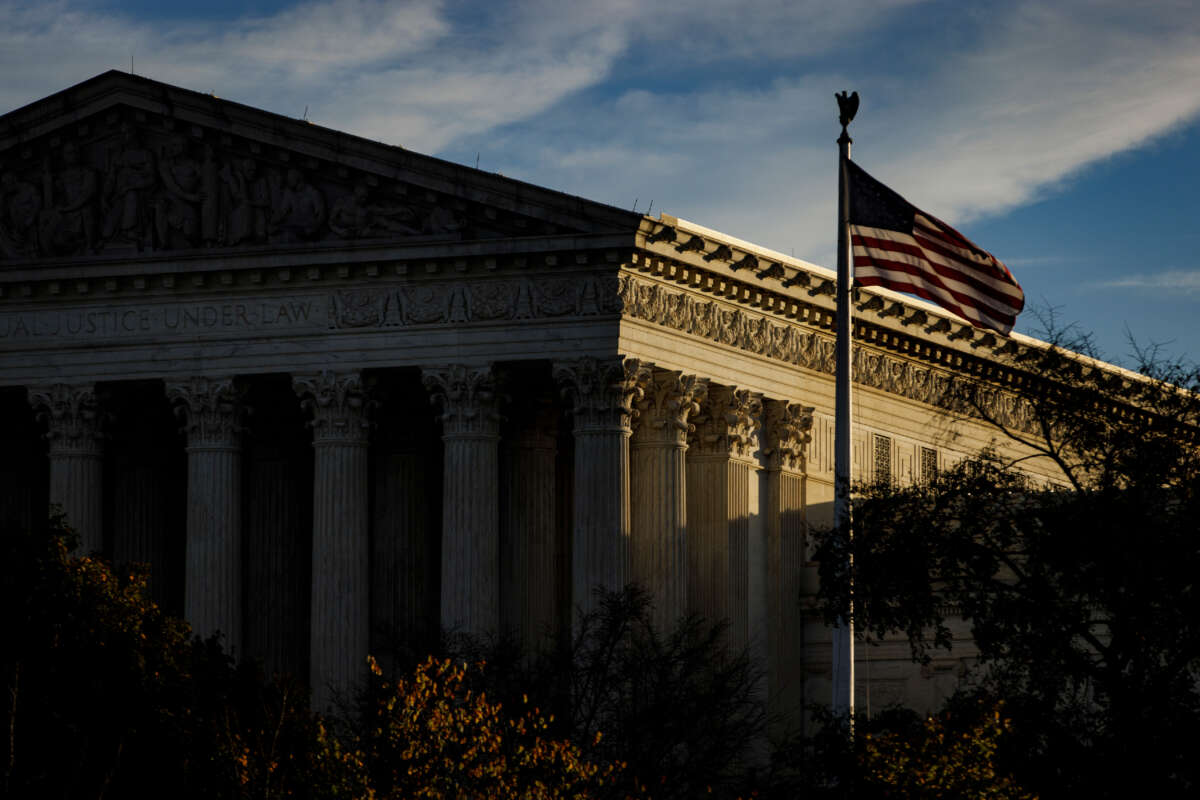Did you know that Truthout is a nonprofit and independently funded by readers like you? If you value what we do, please support our work with a donation.
In a somewhat surprising ruling on Thursday, the Supreme Court ruled to uphold the Indian Child Welfare Act (ICWA), delivering a win to Native American communities by upholding a decades-old law aimed at keeping Native American children from being taken away from their families and tribes.
In a 7-2 decision on Haaland v. Brackeen, justices struck down all challenges to the law, “some on the merits and others for lack of standing,” as Justice Amy Coney Barrett wrote in the majority opinion. The Court rejected the plaintiffs’ argument that the 1978 law unconstitutionally discriminates against white families in the process of adopting Native American children. Justices Clarence Thomas and Samuel Alito dissented.
“Often, Native American Tribes have come to this Court seeking justice only to leave with bowed heads and empty hands. But that is not because this Court has no justice to offer them,” wrote Justice Neil Gorsuch in his concurring opinion. “Our Constitution reserves for the Tribes a place — an enduring place — in the structure of American life. It promises them sovereignty for as long as they wish to keep it.”
The ICWA is a landmark law that was originally put in place to undo the U.S.’s abhorrent history of separating Native children from their parents and communities. For 150 years, thousands of Native children were removed from their families and sent to emotionally and physically abusive boarding schools under a federal initiative that was intended to carry out cultural genocide and forcibly assimilate Native children into white America.
As Native Americans fought against the initiative, the federal government began using adoption as a new way to “assimilate” Native children, purposefully placing Native children into white adoptive families. The ICWA was established to fight back against these efforts, and gives preference to keeping Native children with their families or tribes in the adoption process. Though its implementation is uneven, Native American advocates say that the law is still crucial to helping Native families and tribes keep their sovereignty intact.
Native American advocates and leaders celebrated the decision.
“We hope this decision will lay to rest the political attacks aimed at diminishing tribal sovereignty and creating instability throughout Indian law that have persisted for too long,” said Cherokee Nation Principal Chief Chuck Hoskin Jr., Morongo Band of Mission Indians Chairman Charles Martin, Oneida Nation Chairman Tehassi Hill and Quinault Indian Nation President Guy Capoeman in a joint statement.
NDN Collective President and CEO Nick Tilsen said that the decision is a reminder that lawmakers and advocates must go further in protecting Native sovereignty and reversing centuries of violent oppression. NDN Collective said the decision allows the group to breathe a “sigh of relief.”
“Ensuring Native children can be held and raised by their own communities is an important way to heal our people from the colonization and brutalization waged by the U.S. government for hundreds of years,” said Tilsen. “We must go further, by continuing to address the root causes of Indigenous children still being taken from their families — deeply entrenched trauma and poverty fueled by systemic racism, lack of Indigenous sovereignty, and governmental neglect.”
The case was brought by a white Christian couple, along with the state of Texas and several other couples, who wished to adopt Native American children and argued that the law discriminates against them. The plaintiffs’ argument was so aggressive and broad that Native advocates feared that it would undo trivial sovereignty altogether, as well as pose a threat to other landmark statutes like the Affordable Care Act or the ban on whites-only lunch counters.
The Court agreed with tribal leaders that Native communities are a political group under the ICWA, rather than a racial one, as precedent also establishes. Nearly 500 tribes and over 60 Native organizations had signed onto briefs supporting the upholding of the ICWA.
A terrifying moment. We appeal for your support.
In the last weeks, we have witnessed an authoritarian assault on communities in Minnesota and across the nation.
The need for truthful, grassroots reporting is urgent at this cataclysmic historical moment. Yet, Trump-aligned billionaires and other allies have taken over many legacy media outlets — the culmination of a decades-long campaign to place control of the narrative into the hands of the political right.
We refuse to let Trump’s blatant propaganda machine go unchecked. Untethered to corporate ownership or advertisers, Truthout remains fearless in our reporting and our determination to use journalism as a tool for justice.
But we need your help just to fund our basic expenses. Over 80 percent of Truthout’s funding comes from small individual donations from our community of readers, and over a third of our total budget is supported by recurring monthly donors.
Truthout’s fundraiser ended last night, and we fell just short of our goal. But your support still matters immensely. Whether you can make a small monthly donation or a larger one-time gift, Truthout only works with your help.
